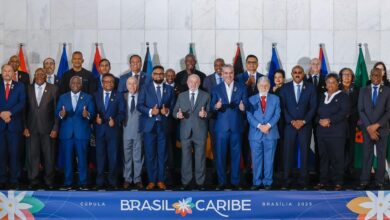(CARICOM Secretariat, Turkeyen, Greater Georgetown, Guyana) When it comes to the earth’s changing climate, the people of the Arctic and Small Island Developing States (SIDS) have a message for the world – the time for action is now.
This message is supported by the recently released report by the Intergovernmental Panel on Climate Change (IPCC) which highlights the vulnerability of the Polar Regions and small island states to climate change.
These two regions, separated by geography, climate and culture, are united by the fact that they are already feeling the dramatic effects of climate change. Both regions are looking for ways to adapt, but on their own, they may not be able to succeed. Strategic policy-relevant and community-driven initiatives need to be addressed through collaboration.
From 27 to 30 May 2007, 40 stakeholders from the Caribbean, Alaska, Fiji, Greenland, French Polynesia, and other locations in the Arctic and Small Island Developing States (SIDS) will gather at a workshop in Belize. They are part of the Many Strong Voices Programme, coordinated by the UNEP/GRID-Arendal, based in Norway, the Center for International Climate and Environment Research – Oslo (CICERO), the CARICOM Climate Change Centre and the Organization of American States’ Department of Sustainable Development.
“We need to focus our research efforts on local communities because adaptation to climate change is a global concern with local manifestations,” says Grete Hovelsrud, Research Director at CICERO.
The Many Strong Voices Programme was launched in late 2005 at a global climate change meeting in Montréal, Canada. Its task is to bring together a consortium of researchers, policy-makers, and organizations to advance mutual learning and exchange of knowledge, research, and expertise on climate change adaptation within and between the Arctic and the SIDS.
“When the programme was launched we were calling it ‘Many Small Voices’, thinking about small nations and regions with small populations joining forces,” explains Joan Eamer, Polar Programme Manager for UNEP/GRID-Arendal. “It is a measure of the depth of concern and strength of purpose of the participants from both regions that the name very soon became ‘Many Strong Voices’.”
Coastal communities in the Arctic and Small Island Developing States are experiencing the effects of climate change first-hand. Because of their close ties to land and sea environments, economies and cultures in both regions are particularly vulnerable to climate change.
Although the natural and human environments in the two regions differ markedly, the effects of rising temperatures, changing precipitation, shifts in the frequency and intensity of extreme weather events, and projected changes in sea level threaten the ecology, economies and social and cultural fabric of both regions.
The four-day workshop will focus not only on strategies to adapt to climate change but also on ways to deliver a strong message to the world. The people in the SIDS and Arctic are responsible for less than 1 per cent of the world’s greenhouse gas emissions. According to the IPCC report, however, they are feeling a disproportionate level of impact.
These regions are bellwethers for climate change and the effects they are feeling now will soon be felt by the rest of the planet. Representatives of the Arctic and SIDS countries have been arguing that the rest of the world needs to pay attention to their situation.
Belize is an ideal location for the workshop, which is hosted by the CARICOM Climate Change Centre, because it too is experiencing the effects of climate change. These include coastal erosion, sea level rise and increased temperatures that have led to the widespread devastation of forests in the region due to insect infestations. At the workshop in Belize, participants will develop a five-year programme and agree on concrete and collaborative steps to address the issues of capacity building, targeted research, communications and outreach activities, and partnership and fundraising goals.
Funding for the workshop is provided by the Government of Norway and the US National Science Foundation.
MEDIA CONTACTS:
Petter Haugneland, Communications Advisor, CICERO (Oslo)
petter.haugneland@cicero.uio.no, mobile: +47 982 34 699
John Crump, Polar Issues Co-ordinator, UNEP/GRID-Arendal (Ottawa)
john.Crump@grida.no, mobile: +1 613 255 3840
CARICOM, Climate Change Centre





